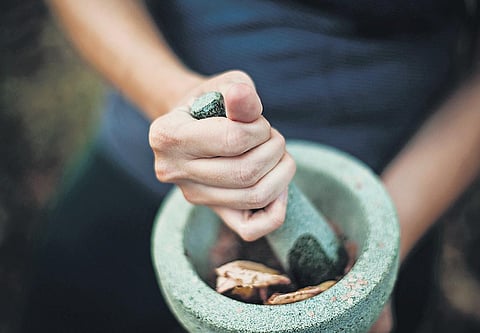

India planned to achieve "health for all" by 2000. We are nowhere near achieving this target even today. For, since Independence, the country followed a healthcare policy that ignored the indigenous, Indian systems of medicine. The consequences were disastrous.
For many centuries in India, physicians of Ayurveda and other traditional medical systems were treating diseases effectively. That they continue to play a vital role in our society became clear during the COVID-19 pandemic.
COVID-19 devastated the Indian population. However, Ayurvedic physicians handled all categories of COVID-19 patients successfully during all the waves of the pandemic. They treated viral illnesses such as dengue, chikungunya and swine flu year after year.
COVID-19 is yet another viral disease for which Ayurveda offers an effective cure. Unfortunately, the details and results of Ayurvedic treatments largely remain unknown except for some articles that appeared in peer-reviewed medical journals.
To Ayurvedic physicians who handled COVID-19 patients of mild, moderate, severe and high-risk categories, it is clear that a great opportunity to contain the damage was missed by not making Ayurvedic therapeutic interventions available to our people.
A couple of months into the pandemic, a few things started becoming clear. In the absence of any effective medication for COVID-19 in the allopathic system, the condition of several patients with mild and moderate cases deteriorated and they died.
Patients were often being rushed to private health facilities in the hope that life-support facilities were available in modern allopathic hospitals. On the other hand, Ayurvedic physicians were able to provide effective prophylactic and curative treatment from the early stage of the disease to prevent it from progressing into the advanced stages. These medicines were used safely for patients of all age groups and also for those with comorbidities.
Although some state governments did not allow Ayurvedic physicians to handle COVID-19 patients, some did not interfere in their treatment. States like Tamil Nadu supported the efforts of Siddha and Ayurveda practitioners.
The Tamil Nadu government officially distributed Kabasura Kudineer, a Siddha medicine, in many localities as a preventive. Several shops sold this medicine and some even distributed it free of cost. It is perhaps due to the largescale distribution of such Ayurveda/Siddha medicines in the first phase of the pandemic that its spread in Tamil Nadu seemed to be less virulent.
The Ayush ministry of the Government of India was constantly providing various inputs on preventives for COVID-19 and it notified a detailed treatment protocol for traditional physicians treating the viral outbreak.
From the Ayurvedic perspective, COVID-19 was identified as a vata-kapha jwara (fever) that resulted from the aggravation of two disease-causing factors in the body, namely vata and kapha. The two are called doshas.
Ayurvedic physicians, who were used to treating similar fevers, were confident that COVID-19 could be treated effectively with Ayurvedic medicines along with careful management of diet and daily regimen.
The patients were advised home quarantine and the physicians kept in touch with them over the phone on a daily basis. The efficacy of Ayurvedic treatment for COVID-19 thereafter spread through word of mouth.
Patients above the age of 60 and those with underlying medical conditions are said to be at higher risk of severe illness from COVID-19. The so-called comorbid conditions include cancer, chronic kidney disease (CKD), chronic obstructive pulmonary disease (COPD), immunocompromised state or a weakened immune system, obesity (Body Mass Index of 30 and above), type-two diabetes mellitus, moderate to severe asthma, heart disease and hypertension. Ayurvedic physicians treated COVID-19 patients with all the above comorbidities, many of whom had multiple comorbidities, with relatively low mortality.
There were more than 700 patients of all categories treated in one single Ayurvedic clinic in Chennai. All the cases were fully documented as per the protocol provided by the Ministry of Ayush. A majority of the cases treated were unvaccinated.
Among the initial 650 patients, 34 per cent were high-risk patients with multiple comorbidities. They included patients with chronic kidney disease (one of whom missed three consecutive sessions of dialysis owing to COVID-19), cancer patients undergoing palliative chemotherapy or radiation therapy, patients with chronic diabetic mellitus, hypertension and BMI over 40.
There were patients over 90 years of age with comorbidities; there were elderly patients with long histories of chronic cardiac disease. There were those with CT features suggestive of acute viral interstitial pneumonitis with 55 per cent lung involvement, patients with low SpO2 levels that dropped below 75 at the slightest exertion of the body, those with respiratory disorders like asthma, chronic obstructive pulmonary disease, etc. All of them were successfully treated with standalone Ayurvedic treatment procedures.
Ayurvedic treatment is also very cost-effective. The need for hospitalisation is far less and there are no invasive procedures. Some of the work of Ayurvedic physicians is now documented and published in peer-reviewed academic journals.
With more than four lakh Ayurvedic practitioners in India and an independent ministry to take care of the traditional systems, had these medical systems been called upon to handle the pandemic, India could have curtailed the number of fatalities in COVID-19, especially when the allopathic system the world over failed to come up with a cure.
Reports are coming in from all over the country of many Ayurvedic physicians successfully treating COVID-19. Their success should draw the government’s attention to the enormous potential of Ayurveda.
The Government of India should utilise this opportunity to give Ayurveda a big push and re-establish its pre-eminence and improve public healthcare in India. A lesson can also be learnt about handling pandemics in the future.
(Girija is a senior Ayurveda practitioner and Mukundan is founding trustee of Centre for Policy Studies. The latter can be reached at t_m_mukundan@rediffmail.com)